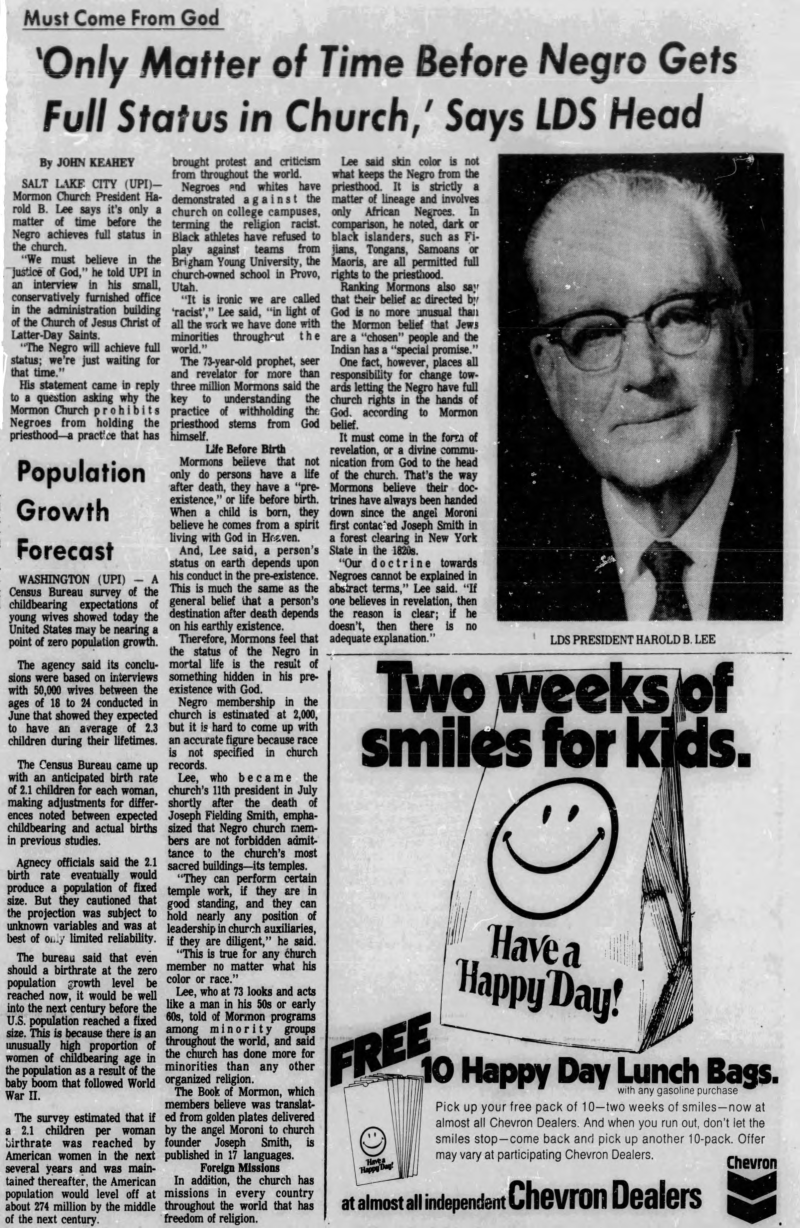John Keahey reports President Harold B. Lee as saying that it's only a matter of time before the Negro achieves full status in the church.
- Type
- News (traditional)
- Source
- John Keahey
- Hearsay
- Journalism
- Reference
John Keahey, "‘Only matter of time before negro gets full status in church,” says LDS head," The Daily Herald (September 26, 1972): 10, accessed October 7, 2022
- Scribe/Publisher
- Daily Herald
- Audience
- General Public
- Transcription
Must Come From God
Only Matter Of Time Before Negro Gets Full Status in Church,' Says LDS Head
By JOHN KEAHEY
SALT LAKE CITY (UPI)--Mormon Church President Harold B. Lee says it's only a matter of time before the Negro achieves full status in the church.
"We must believe In the justice of God," he told UPI in an interview in his small, conservatively furnished office in the administration building of the Church of Jesus Christ of Latter-Day [sic] Saints.
"The Negro will achieve full status; we're just waiting for that time."
His statement came in reply to a question asking why the Mormon Church prohibits Negroes from holding the priesthood--a practice that has brought protest and criticism from throughout the world.
Negroes and whites have demonstrated against the church on college campuses, terming the religion racist. Black athletes have refused to play against teams from Brigham Young University, the church-owned school in Provo, Utah.
"It is ironic we are called 'racist'," Lee said, "in light of all the work we have done with minorities throughput the world."
The 73-year-old prophet, seer and revelator for more than three million Mormons said the key to understanding the practice of withholding the priesthood stems from God himself.
Life Before Birth
Mormons believe that not only do persona have a life after death, they have a "preexistence," or life before birth. When a child is born, they believe he comes from a spirit living with God in Heaven.
And, Lee said, a person's status on earth depends upon his conduct in the pre-existence. This is much the same as the general belief that a person's destination after death depends on his earthly existence.
Therefore, Mormons feel that the status of the Negro in mortal life is the result of something hidden in his preexistence with God.
Negro membership in the church is estimated at 2,000, but it is hard to come up with an accurate figure because race is not specified in church records.
Lee, who became the church's 11th president in July shortly after the death of Joseph Fielding Smith, emphasized that Negro church members are not forbidden admittance to the church's most sacred buildings--its temples.
"They can perform certain temple work, if they are in good standing, and they can hold nearly any position of leadership in church auxiliaries, if they are diligent.
"This is true for any church member no matter what his color or race."
Lee, who at 73 looks and acts like a man in his 50s or early 60s, told of Mormon programs among minority groups throughout the world, and said the church has done more for minorities than any other organized religion.
The Book of Mormon, which members believe was translated from golden plates delivered by the angel Moroni to church founder Joseph Smith, is published in 17 languages.
Foreign Missions
In addition, the church has missions in every country throughout the world that has freedom of religion.
Lee said skin color is not what keeps the Negro from the priesthood. It is strictly a matter of lineage and involves only African Negroes. In comparison. he noted, dark or black islanders, such as Fijians, Tongans, Samoans, Maoris, are all permitted full rights to the priesthood.
Ranking Mormons also say that their belief as directed by God is no more unusual than the Mormon belief that Jews are a "chosen" people and the Indian has a "special promise."
One fact, however, places all responsibility for change toward letting the Negro have full church rights in the hands of God. according to Mormon belief.
It must come in the form of revelation, pr a divine communication from God to the head of the church. That's the way Mormons believe their doctrines have always been handed down since the angel Moroni first contacted Joseph Smith in a forest clearing In New York
State in the 1820s.
''Our doctrine towards Negroes cannot be explained in abstract terms," Lee said. "If one believes in revelation, then the reason is clear; if he doesn't, then there ls no adequate explanation."
The B. H. Roberts Foundation is not owned by, operated by, or affiliated with the Church of Jesus Christ of Latter-day Saints.

